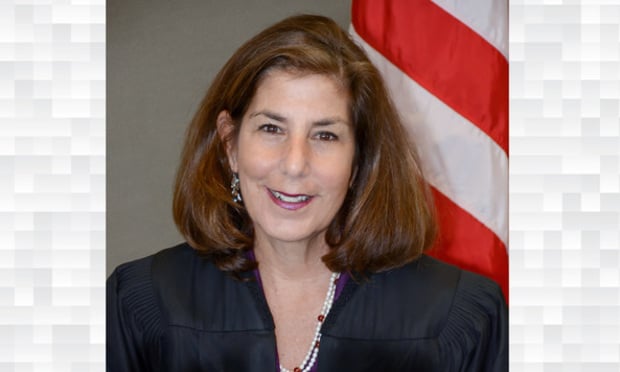Dismissed: Suit to End Long Voting Lines in Georgia's Largest Counties Fails
Sean Young, legal director of the ACLU of Georgia, said that U.S. District Judge Amy Totenberg left open the possibility the suit could be refiled if Fulton, Cobb, DeKalb and Gwinnett election boards don't do enough to curtail long lines in 2020.
February 12, 2020 at 04:13 PM
4 minute read
 Judge Amy Totenberg (Courtesy photo)
Judge Amy Totenberg (Courtesy photo)
A federal judge in Atlanta on Wednesday dismissed a lawsuit intended to curtail long voting lines at polling places in the state's four largest counties during the 2018 election.
U.S. District Judge Amy Totenberg of the Northern District of Georgia dismissed the voting-rights case, brought by the ACLU of Georgia and the ACLU Foundation in New York, without prejudice. This left open the possibility that it could be refiled "if or when the county elections officials (or the state for that matter) fail to constitutionally carry out their duties to properly conduct and administer the 2020 elections."
Broader disputes
Totenberg's ruling comes as Georgia faces a national spotlight over voter suppression issues stemming from the 2018 gubernatorial race. For instance, Democratic gubernatorial candidate Stacey Abrams refused to concede the race to Republican Brian Kemp, who campaigned while overseeing the election as secretary of state. Abrams had claimed measures Kemp implemented during his tenure were intended to suppress the minority vote. Kemp and his attorneys have repeatedly denied those claims, but Abrams has used her national platform to combat voter suppression and voter purges across the country.
Meanwhile, an omnibus voting rights suit brought against the secretary of state and state election board following the 2018 election by a group Abrams founded in Georgia to combat voter suppression remains active. The suit seeks sweeping federal relief to end practices, including those targeted by the ACLU suit, intended to suppress the minority vote.
And Georgia's two Senate seats are also up for grabs. First-term Republican Sen. David Perdue is facing reelection, as is Sen. Kelly Loeffler, whom Kemp appointed last month to fill retiring Republican Sen. Johnny Isakson's seat over the objections of President Donald Trump.
Statutory obligation
In Wednesday's order, Totenberg said that any remedy requiring county election boards to provide "all necessary funds to adequately conduct the elections" or instructing them "to take all necessary actions to carry out their functions so as not to impinge on voters' federal constitutional rights … is nothing more than a request that the court order the counties and [boards of elections] to comply with their statutory obligation."
"This court cannot guarantee that voters will not have to stand in line, or that absentee ballots will not get delayed or lost in the mail," Totenberg concluded. "And any injunction that would pretend otherwise and purport to impose obligations on defendants to take 'all necessary action' to ensure against such circumstances would be too amorphous to be capable of enforcement."
The ACLU suit was filed on behalf of voters in Fulton, DeKalb, Cobb and Gwinnett counties just months after five federal judges in Georgia issued six temporary restraining orders against then Secretary of State Brian Kemp, now Georgia's governor, as votes were being cast or ballots being counted in the 2018 election. The TROs were intended to increase the number of counted ballots. Attorneys with Dechert in Chicago and New York joined with the ACLU in the litigation.
Sean Young, legal director of the ACLU of Georgia, said that, unlike other voting rights lawsuits pending since the 2018 election, this one was directed at county election officials rather than the state. "We needed to hold county election officials accountable for their role in running elections," he said. "Counties pass budgets that dictate how many resources are set aside for an election; county election boards vote on polling place changes, and other resource allocation issues."
Young also said that Totenberg's order "essentially invited plaintiffs to revive this lawsuit if there are imminent signs" that insufficient or disfunctional voting machines and a decrease in polling places were generating hours-long voting lines.
"The secretary of state absolutely has a responsibility for running smooth elections, but very few people recognize the influence county election officials have," he said. "County election officials are not being held to account for election irregularities."
Bryan Tyson, an attorney with Taylor English Duma defending the Gwinnett County election board, referred questions to county spokesman Joe Sorenson. Sorenson couldn't be reached. Cobb County Senior Associate County Attorney Elizabeth Monyak called Totenberg's decision 'well-reasoned," and said the county was "very pleased."
Attorneys with the Fulton and DeKalb county law departments couldn't be reached.
This content has been archived. It is available through our partners, LexisNexis® and Bloomberg Law.
To view this content, please continue to their sites.
Not a Lexis Subscriber?
Subscribe Now
Not a Bloomberg Law Subscriber?
Subscribe Now
NOT FOR REPRINT
© 2025 ALM Global, LLC, All Rights Reserved. Request academic re-use from www.copyright.com. All other uses, submit a request to [email protected]. For more information visit Asset & Logo Licensing.
You Might Like
View All
Transgender Care Fight Targets More Adults as Georgia, Other States Weigh Laws

Georgia Republicans Push to Limit Lawsuits. But Would That Keep Insurance Rates From Rising?
5 minute read
A Plan Is Brewing to Limit Big-Dollar Suits in Georgia—and Lawyers Have Mixed Feelings
10 minute readLaw Firms Mentioned
Trending Stories
Who Got The Work
J. Brugh Lower of Gibbons has entered an appearance for industrial equipment supplier Devco Corporation in a pending trademark infringement lawsuit. The suit, accusing the defendant of selling knock-off Graco products, was filed Dec. 18 in New Jersey District Court by Rivkin Radler on behalf of Graco Inc. and Graco Minnesota. The case, assigned to U.S. District Judge Zahid N. Quraishi, is 3:24-cv-11294, Graco Inc. et al v. Devco Corporation.
Who Got The Work
Rebecca Maller-Stein and Kent A. Yalowitz of Arnold & Porter Kaye Scholer have entered their appearances for Hanaco Venture Capital and its executives, Lior Prosor and David Frankel, in a pending securities lawsuit. The action, filed on Dec. 24 in New York Southern District Court by Zell, Aron & Co. on behalf of Goldeneye Advisors, accuses the defendants of negligently and fraudulently managing the plaintiff's $1 million investment. The case, assigned to U.S. District Judge Vernon S. Broderick, is 1:24-cv-09918, Goldeneye Advisors, LLC v. Hanaco Venture Capital, Ltd. et al.
Who Got The Work
Attorneys from A&O Shearman has stepped in as defense counsel for Toronto-Dominion Bank and other defendants in a pending securities class action. The suit, filed Dec. 11 in New York Southern District Court by Bleichmar Fonti & Auld, accuses the defendants of concealing the bank's 'pervasive' deficiencies in regards to its compliance with the Bank Secrecy Act and the quality of its anti-money laundering controls. The case, assigned to U.S. District Judge Arun Subramanian, is 1:24-cv-09445, Gonzalez v. The Toronto-Dominion Bank et al.
Who Got The Work
Crown Castle International, a Pennsylvania company providing shared communications infrastructure, has turned to Luke D. Wolf of Gordon Rees Scully Mansukhani to fend off a pending breach-of-contract lawsuit. The court action, filed Nov. 25 in Michigan Eastern District Court by Hooper Hathaway PC on behalf of The Town Residences LLC, accuses Crown Castle of failing to transfer approximately $30,000 in utility payments from T-Mobile in breach of a roof-top lease and assignment agreement. The case, assigned to U.S. District Judge Susan K. Declercq, is 2:24-cv-13131, The Town Residences LLC v. T-Mobile US, Inc. et al.
Who Got The Work
Wilfred P. Coronato and Daniel M. Schwartz of McCarter & English have stepped in as defense counsel to Electrolux Home Products Inc. in a pending product liability lawsuit. The court action, filed Nov. 26 in New York Eastern District Court by Poulos Lopiccolo PC and Nagel Rice LLP on behalf of David Stern, alleges that the defendant's refrigerators’ drawers and shelving repeatedly break and fall apart within months after purchase. The case, assigned to U.S. District Judge Joan M. Azrack, is 2:24-cv-08204, Stern v. Electrolux Home Products, Inc.
Featured Firms
Law Offices of Gary Martin Hays & Associates, P.C.
(470) 294-1674
Law Offices of Mark E. Salomone
(857) 444-6468
Smith & Hassler
(713) 739-1250







